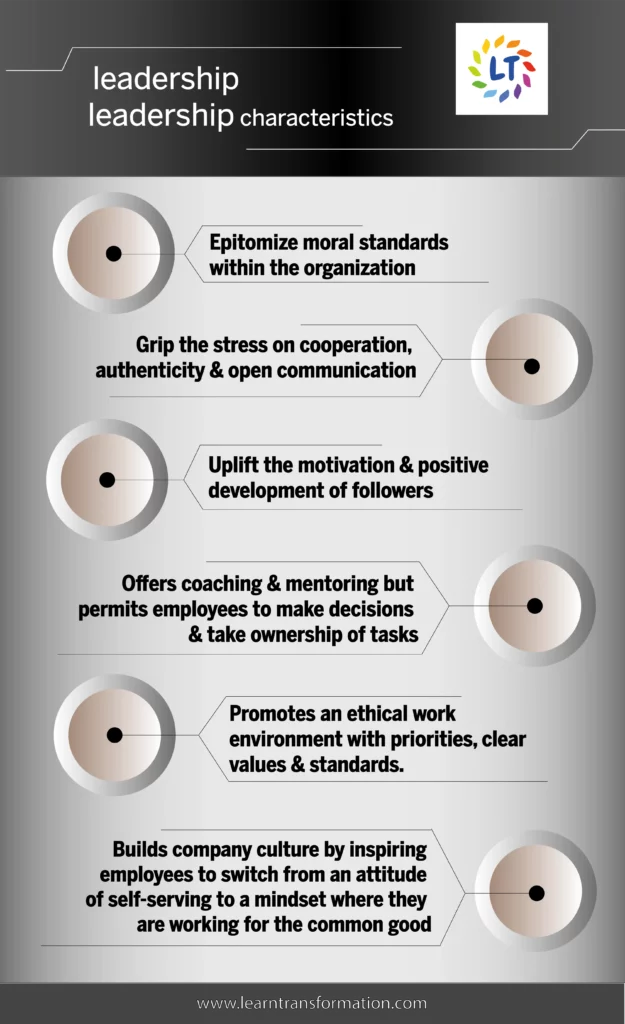Leadership is the ability to guide others without force into a direction or decision that leaves them still feeling empowered and accomplished.
Lisa Cash Hanson
Leadership is more than just a position or a title; it’s a collection of unique talents and characteristics that enable people to motivate, direct, and influence others toward a common objective.Thus, successful leaders build their legacies on the foundation of these leadership characteristics. In this blog, we’ll go in-depth on the fundamental characteristics of excellent leadership that set them apart. Understanding these characteristics is important whether you want to become a better leader or just improve your current leadership abilities.
Leadership has influenced society, businesses, and people throughout history. In business, politics, athletics, and education, as well as other areas of life, effective leadership is the cornerstone of advancement, creativity, and success.
Leadership Characteristics
1. Vision and Objectives
A strong leader has a distinct vision and goal. They have the ability to see beyond the present and convey a compelling vision to inspire their team. Hence, setting meaningful goals and leading the team towards them are made possible by this clarity of purpose. Additionally, a team or organisation can be given clear direction through its vision and mission. They act like a North Star, providing direction for decisions and activities.
- Motivates: Team members are inspired and motivated by a clear vision and purpose. People are more interested and dedicated when they comprehend the greater vision and their part in accomplishing it.
- Alignment: Team actions are in line with the vision and purpose. Furthermore, they make certain that everyone is pursuing the same objectives, which lessens confusion and boosts efficiency.
2. Self-confidence
Confidence spreads easily. Leaders that exude confidence motivate their staff to do the same. This confidence in oneself and in one’s skills is what inspires followers to have faith in the leader.Since it sets the tone for the entire team, confidence in oneself is a crucial quality for leaders.
- Trustworthiness: Team members are more likely to feel confident. When a leader has confidence in their skills, it inspires followers to do the same.
- Effective Decision-Making: Leaders who are confident are more likely to make timely, well-informed decisions. Hence, they are less prone to question their decisions, which is important for leaders.
- Risk-taking: Leaders who are self-assured may take measured chances. It’s the bravery to leave one’s comfort zone and investigate fresh avenues.
Check it out – A Good Leader Is A Good Follower
3. Successful Communication
Leadership is centred on communication. In addition to being intelligent, great leaders are also great listeners. Additionally, they encourage honest and open communication among team members to make sure that everyone is on the same page.
- Clarity: Effective communication eliminates confusion and misinterpretations. Thus, effective leaders may set the environment for successful execution by clearly communicating their thoughts and expectations.
- Building Relationships: Effective communication techniques aid in the development of strong bonds between team members, stakeholders, and clients. Communication that is open and honest often helps to develop rapport and trust.
- The ability to communicate clearly is crucial for dispute resolution. Thus, diplomatic and sympathetic communicators can mediate conflicts and preserve team unity.

Leader’s Tip
Your team’s aims and objectives should be made very clear. Make sure everyone is aware of their part in reaching these objectives.
4. Adaptability
The environment for business is ever-changing. Leaders who can shift with the times and have a flexible mindset are better suited to guide their teams through ambiguity and transition.
- Innovation: A flexible leader fosters creativity among their workforce. They encourage a creative atmosphere by being flexible in their thinking and receptive to new ideas.
- Team morale: Leaders that embrace change well create an example for their subordinates. This may improve group spirit and lessen change resistance.
5. Emotional intelligence and sympathy
Understanding the needs and feelings of their team members is made possible through empathy in leaders. They can effectively control both their own emotions and those of others thanks to emotional intelligence. These traits encourage healthy interpersonal connections.
- Improved Communication: Empathic and emotionally intelligent leaders are better able to relate to their team members. They are able to comprehend their feelings, requirements, and worries, which enhances trust and communication.
- Conflict Resolution: Leaders who exhibit empathy are better able to handle difficult situations with tact and understanding. Leaders can more successfully manage conflicts by recognising and treating emotions.
- Team morale: Empathetic managers foster a helpful and upbeat work atmosphere. Team morale and productivity are raised when members feel valued and appreciated.
6. Resilience
Adversity and setbacks are commonplace for leaders. The capacity to overcome these obstacles is resilience. The team feels more confident knowing their leader can handle challenging circumstances as a result of this quality.
- Stress management: Leaders who are resilient are better able to deal with pressure and adversity. They are able to remain cool under pressure, leading by example for the rest of their team.
- Resilience encourages innovative problem-solving. Fast-recovering leaders are more likely to come up with novel answers to challenging problems.
- Inspiration: A leader’s tenacity might serve as an example for the group. The confidence that their leader can handle challenging circumstances with fortitude motivates the team to persevere.
7. Decisiveness
Confusion and stagnation can result from indecision. Even under extreme circumstances, great leaders make wise judgements. They make informed decisions after carefully weighing their options.
- Efficiency: By taking prompt action, decisive leaders encourage efficiency. This avoids delays and keeps the group on schedule.
- Clarity: Decisiveness gives the team clarity. Team members can align their efforts when a leader is decisive since they know what is expected of them.
- Decision-making leaders are more adept at controlling risks. They analyse the advantages and disadvantages and choose wisely, decreasing the possibility of costly errors.
- Team members are more confident when their leader is decisive. They have faith in their leader to make the difficult decisions when necessary.
8. Accountability
Leaders show by example. They assume accountability for their choices and behaviours, establishing a level of responsibility that permeates the entire team.
- Credibility: Team members are held to a high level by leaders who hold themselves accountable. By accepting accountability for their actions and judgements, they gain respect and credibility.
- Accountability is key to fostering trust among team members. Team members are more likely to follow suit when they observe that their leader is responsible.
- Learning and Development: Accountability helps to create a culture of ongoing development. Leaders who admit their errors are better able to learn from them and make the required changes.
- Holding leaders responsible for the team’s success increases the likelihood of achieving the required results, ensuring that objectives are met.
Also read: 35 Best Leadership Books of All Time
9. Creativity and Innovation
Leadership in the fast-paced world of today must foster creativity and innovation. They ought to be receptive to fresh perspectives and risk-takers.
- Competitive Advantage: In today’s dynamic corporate environment, innovative leaders maintain an advantage. Additionally, they are able to spot and seize chances for development and improvement.
- Problem solving: Problem solution requires creativity. Thus, leaders who support innovation can come up with creative answers to difficult problems.
- Engagement of employees: Promoting an innovative and creative culture can increase employee engagement. When leaders support and carry out team members’ ideas, team members feel more appreciated.
10. Empowerment
Excellent team leaders give their members autonomy. They distribute duties and offer chances for advancement so that everyone on their team can realise their full potential.
- Increased Motivation: Providing team members with responsibility and decision-making authority can significantly increase their motivation. When people feel trusted and respected at work, they are more likely to be engaged and devoted.
- Potential Development: When team members are empowered, they may reach their greatest potential. Leaders who offer their team members chances to learn and enhance their skills help them to become more capable and competent.
- Effective delegation is a critical component of leadership. Delegation and empowerment go hand in hand since delegation entails giving team members responsibility for tasks and projects. As a result, the team member’s sense of ownership increases and the leader’s time is freed up.
11. Integrity
The basis of trust is integrity. Leaders that operate with integrity, morality, and consistency establish enduring bonds with their followers and other stakeholders.
- Transparency: Integrate leaders are open and honest about their plans and decisions. Additionally, they are transparent about their motives and the thinking behind their decisions, which fosters understanding and lessens scepticism.
- Long-term Relationships: Integrity promotes the development of enduring, gratifying connections.Thus, leaders with a solid reputation for honesty are more likely to inspire collaboration, producing a positive and supportive workplace culture.
Leader’s Tip
Develop effective communication abilities. Encourage team members to communicate honestly and openly by listening intently and being explicit in your messages.
Conclusion
Individuals can cultivate and improve leadership characteristics, talents, and qualities over time, rather than having them as fixed traits. Successful leaders are constantly working to enhance these qualities in order to become more powerful and effective leaders. The fundamentals of leadership characteristics are true regardless of the situation you’re in, whether you’re managing a team in a business environment, a nonprofit, or any other setting. Hence, you may become a more successful and persuasive leader who can lead your team to victory in any endeavour by incorporating these leadership characteristics into your leadership style.
Key Takeaways
- Leadership is about a certain set of abilities and traits that motivate, direct, and influence others towards a common objective.
- Through self-awareness, education, and practice, leadership characteristics can be enhanced over time.
- Leadership characteristics are malleable, vital for success in various settings.
FAQs
What are the characteristics of a successful leader?
A strong leader has a distinct vision and goal. They have the ability to see beyond the present and convey a compelling vision to inspire their team. Hence, setting meaningful goals and leading the team towards them are made possible by this clarity of purpose.
What are your core beliefs about good leaders and effective leadership?
Excellent team leaders give their members autonomy. They distribute duties and offer chances for advancement so that everyone on their team can realise their full potential. Leaders show by example. Thus. they assume accountability for their choices and behaviours, establishing a level of responsibility that permeates the entire team.
What makes a great leader?
The fundamentals of leadership characteristics are true regardless of the situation you’re in, whether you’re managing a team in a business environment, a nonprofit, or any other setting. Furthermore, you may become a more successful and persuasive leader who can lead your team to victory in any endeavour by incorporating these leadership characteristics into your leadership style.

